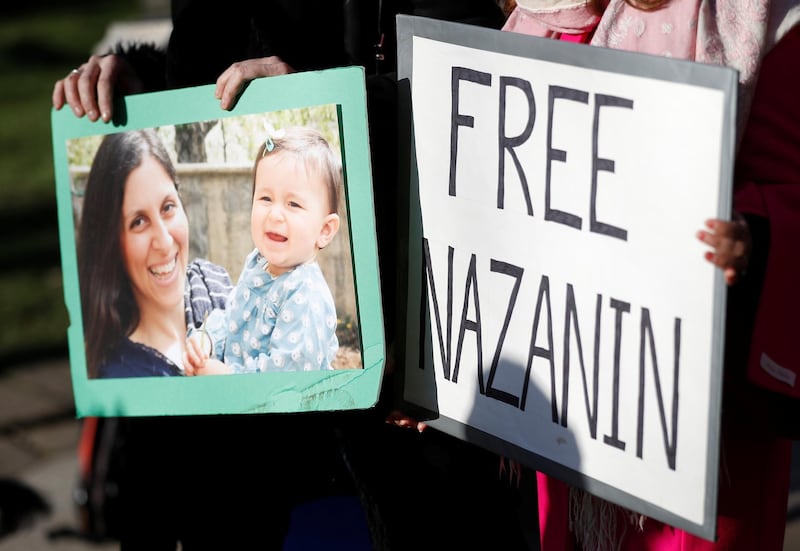Iran state television has aired a new video about imprisoned British-Iranian Nazanin Zaghari-Ratcliffe, accusing her of running a global spy network.
The broadcast was part of an "aggressive propaganda campaign" by Iran to blacken Ms Zaghari-Ratcliffe's name ahead of a new court appearance on December 10, her husband Richard Ratcliffe told The National.
Ms Zaghari-Ratcliffe, already serving a five-year prison sentence for allegedly planning the "soft toppling" of Iran's government while travelling there with her toddler daughter, now faces new charges that could add 16 years to her prison term.
Her plight has gained momentum in recent weeks as British foreign minister Boris Johnson faces tremendous criticism at home over his handling of it, after he mistakenly claimed she was “"teaching people journalism" when she was arrested last year, rather than on holiday.
The five-minute report on Ms Zaghari-Ratcliffe, aired by state-controlled Channel 2 on Thursday, claimed she spied and lobbied western governments to step up sanctions against Iran during her time at Training Station five years ago.
According to The Times, the television report showed a pay-slip she received when she worked at the charity on a freelance basis for three months in 2012. It also displayed an anonymous email account that she set up.
_______________
Read more:
[ Iran airs more allegations against detained British woman ]
[ Detained Briton addresses rally from Iranian prison ]
[ Iran's bad behaviour can't continue to be rewarded ]
_______________
The broadcast claimed she joined the Training Station project “with the aim of collecting information from people in Iran under the cover of journalism” and that she had “[made] up scenarios and news” to increase sanctions against Iran. It further added that her actions were funded by the CIA.
The broadcast was the second in a series to be aired on Iranian state television about Ms Zaghari-Ratcliffe. Last Thursday, a seven-minute report included close-ups of an April 2010 pay stub from her previous employer, the BBC World Service Trust.
It also included an e-mail from June 2010 in which she wrote about the "ZigZag Academy," a BBC World Service Trust project in which the trust trained "young aspiring journalists from Iran and Afghanistan through a secure online platform".
The broadcast made a point to highlight Mr Johnson’s remarks about Ms Zaghari-Ratcliffe "training journalists", even though the foreign secretary had later corrected himself.
Ms Zaghari-Ratcliffe left the BBC in 2011 and then joined the Thomson Reuters Foundation, the charitable arm of the news agency. Both her husband and Thomson Reuters have repeatedly stressed that she was not training journalists or involved in any work regarding Iran while there.
Speaking on Saturday, Mr Ratcliffe said the latest TV reports seemed timed to build up the case against his wife ahead of her next court appearance, as well as to exert as much pressure as possible on the British government.
“It’s clearly a very cynical attempt to try and make her out to be some important British spy,” he said. “I don’t know if that’s to try and justify her new court case or to put pressure on the British government, because the foreign secretary is planning to go to Iran fairly soon. It’s probably both.”
It comes following reports that Britain is considering making a £400 million (Dh1.96bn) payment to Tehran, in a diplomatic effort at improving the 38-year-old's chances of release.
Mr Ratcliffe said his wife’s role at Training Station was to translate training course modules into Farsi, but that the texts never appear to have been used.
He added that the material shown in both broadcasts would have been obtained by investigators from the hard-line Revolutionary Guard, who immediately gained access to all her email accounts after her arrest.
“From what they’ve put on TV [on Thursday], they’ve linked it to the BBC stuff before and also to Thomson Reuters, to try and make it into some big global conspiracy,” he said. “Way back from the beginning of the allegations, they’ve tried to make it seem as though she’s involved in this big secret global network of spies, and so they just keep on spinning that story in different forms.”
“It’s crazy, crazy stuff,” he said, adding that he would be complaining directly to the Iranian embassy.
Ms Zaghari-Ratcliffe collapsed, had a panic attack, and had to be injected with a vitamin B complex and a sedative to calm her down after seeing the broadcast last week. Mr Ratcliffe expressed concerns over the potential impact that this latest news would have on his wife, with a third episode of the series expected to be broadcast next Thursday.
Hopes had been raised that Ms Zaghari-Ratcliffe could be eligible for early release after the Iranian authorities ordered a health assessment, amid fears she is on the verge of a nervous breakdown.
Mr Ratcliffe said the family was trying to stay hopeful despite the stream of accusations from Iran.
“On the one hand, we’re hearing all those noises, saying she might be out soon. On the other hand, state broadcasters are putting out all this really aggressive propaganda saying that she’s the head of a network of spies – not even just a spy – and she’s being taken to court for a second time… It all just feels incredibly political.”
Mr Ratcliffe said he was “pretty sure” that Mr Johnson would be going out to Iran in the coming weeks, although it is not yet clear whether he will be able to join the foreign secretary on the trip. “I’m still hopeful… I haven’t given up hope,” he said.





